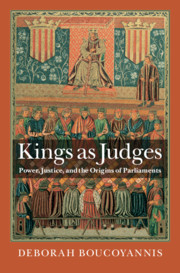Book contents
- Kings as Judges
- Kings as Judges
- Copyright page
- Contents
- Figures
- Tables
- Preface and Acknowledgments
- Part I The Origins of Representative Institutions: Power, Land, and Courts
- Part II The Origins of Representative Practice: Power, Obligation, and Taxation
- Part III Trade, Towns, and the Political Economy of Representation
- 7 Courts, Institutions, and Cities: Low Countries and Italy
- 8 Courts, Institutions, and Territory: Catalonia
- 9 The Endogeneity of Trade: The English Wool Trade and the Castilian Mesta
- Part IV Land, Conditionality, and Property Rights
- Part V Why Representation in the West: Petitions, Collective Responsibility, and Supra-Local Organization
- Bibliography
- Index
7 - Courts, Institutions, and Cities: Low Countries and Italy
from Part III - Trade, Towns, and the Political Economy of Representation
Published online by Cambridge University Press: 18 June 2021
- Kings as Judges
- Kings as Judges
- Copyright page
- Contents
- Figures
- Tables
- Preface and Acknowledgments
- Part I The Origins of Representative Institutions: Power, Land, and Courts
- Part II The Origins of Representative Practice: Power, Obligation, and Taxation
- Part III Trade, Towns, and the Political Economy of Representation
- 7 Courts, Institutions, and Cities: Low Countries and Italy
- 8 Courts, Institutions, and Territory: Catalonia
- 9 The Endogeneity of Trade: The English Wool Trade and the Castilian Mesta
- Part IV Land, Conditionality, and Property Rights
- Part V Why Representation in the West: Petitions, Collective Responsibility, and Supra-Local Organization
- Bibliography
- Index
Summary
City-republics have traditionally served as exemplars of participatory government. Their bottom-up organization would seem to suggest an alternative path to representative emergence. The three chapters of Part II address this challenge of equifinality; this chapter does so in two ways. First, it points out that republics are different forms of governance than representative polities, as they eschew a central executive and don't involve the integration of varied social groups. Second, despite such differences, republics and municipal governance can also be shown to reflect the basic logic of this book, as they were preceded by a period of centralized rule under conditional relations. These enabled the institutional learning that was necessary for participatory institutions to consolidate. The absence of an executive, however, also meant that they did not survive over the long term. These points are demonstrated by an examination of Italian city-states and of the Low Countries. Both Flanders and Holland had a thriving urban sector, but they retained their participatory institutions longer because the exective authority of the count was comparatively greater. The Swiss Cantons are briefly considered. The role of trade emerges as endogenous to political organization.
Keywords
- Type
- Chapter
- Information
- Kings as JudgesPower, Justice, and the Origins of Parliaments, pp. 153 - 179Publisher: Cambridge University PressPrint publication year: 2021



